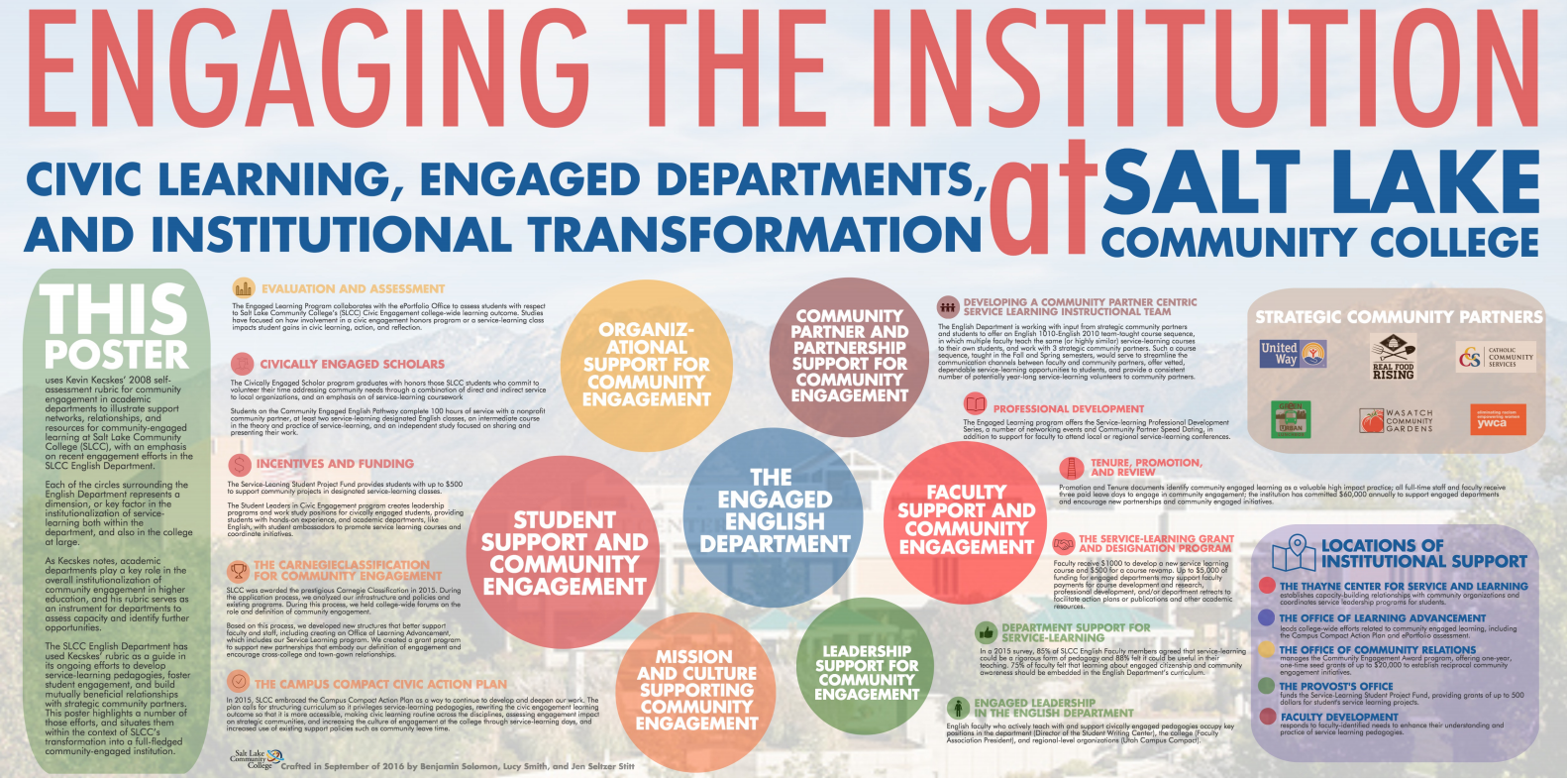Engaged Department Designation
Request for Proposal (RFP)Program description
The Community-Engaged Learning Designation (CELD) program not only facilitates individual community-engaged learning course designations but also supports a larger, coordinated effort to integrate civic engagement through engaged departments/programs.
An engaged department was described by Battistoni et al. (2003) as one in which the emphasis shifts from individual faculty, courses, and curricular redesign to collective faculty culture – changing the culture from one of ‘my work’ to one of ‘our work’. Further, the engaged department has shifted faculty culture toward a focus on the public work of department members. The unit shares a joint commitment to community engagement and public scholarship, but members of the unit support each other in carrying out the best practices of these commitments. This means everything from a common set of values (a mission/vision statement, common language, presence of these values in publications and public messages, and meaningful presence in the rewards structure), to shared commitment to community partners (who may work with different actors in the unit across time), to a comprehensive and strategically-planned curriculum that integrates engagement throughout the major or academic program (Howe, DePasquale, Hamshaw, & Westdijk, 2010).
The goals of the CELD program are to:
- Engage and retain students by supporting fauclty and departments in their commitment to providing high-impact practices.
- Facilitate the formal designation of community-engaged learning courses, Engaged Departments, and Civic Faculty Fellows.
- Allow innovative practitioners to develop community-engaged learning courses and departmental structures as a way of teaching and learning that leverages "community-based public problem solving that not only generates new knowledge and higher order cognitive outcomes, but develops the civic skills of critical thinking, public deliberation, collective action and social ethics" (Saltmarsh, 2002, p. viii).
- Make civic learning routine across the disciplines by supporting a departmental level civic focus.
- Support mutually beneficial and sustainable college-community partnerships on a departmental level.
- Take specific steps to make reciprocal community engagement a cultural norm.
- Support the implementation of SLCC’s Civic Literacy Student Learning Outcome.
Existing SLCC Engaged Departments
Guidelines
Eligible Applicants
- The CELD program is open to any department/program that wants to pursue the Engaged Department designation. Individual faculty may also submit new course designations as a component of an engaged department but these proposals must still complete the individual course designation RFP.
Supported Projects
Engaged Department:
- Individual departments and programs can apply for funding to support engaged department work. Up to $5,000 of funding may support faculty payments for community-engaged learning course development and research, professional development, and/or department retreats to facilitate action plans, and/or to create publication content. Civic faculty fellows funding is also available for faculty who want to lead this work.
For example, a lead faculty member might establish a departmental community engagement committee that distributes an engagement newsletter, creates community-engaged learning faculty resources/a web presence, establishes departmental-wide community partnerships and/or facilitates faculty development for colleagues. Matching funds from the department are encouraged. Please note faculty are paid only once for designating individual courses.
Process for Engaging Departments
- Administrators and faculty express interest in creating an engaged department/program and discussions begin with stakeholders
- Department faculty collaborate with administrators and Associate Deans to complete the Engaged Department Rubric, (Kecskes, 2008) and identify a Civically Engaged Scholars pathway
- A department-wide discussion on the plan and rubric rankings occurs (may also happen after proposal is submitted)
- Faculty members/administrators submit proposals to the CELD Review Committee via the Engaged Learning Coordinator
- Funding is approved/declined
- Action plan implemented and courses are designated until an engaged department is created. Designation cycle and funding may occur again if additional courses are added and/or additional steps are taken
Evaluation Criteria & Procedure
The CELD committee reviews all proposals based on merit and/or on the criteria stated in the Engaged Department rubric. Judging of engaged department proposals happens on a case-by-case basis. Only a limited number of funding grants are awarded for exemplary proposals. The CELD review committee is comprised of full-time and adjunct community-engaged learning practitioners and community partner organization representatives who have significant knowledge of community-engaged learning pedagogy.
